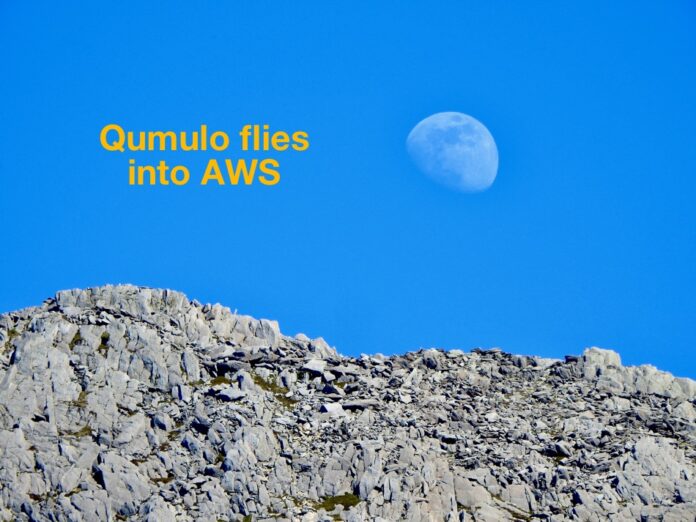Scale-out parallel file system supplier Qumulo now runs natively in AWS. The company has announced the initial private availability of Qumulo Cloud Native file system in the AWS cloud.
Qumulo’s Core file system software was available on AWS back in 2021, but this latest addition is different.

Kiran Bhageshpur, CTO at Qumulo, told B&F: “What we had announced back in 2021 was what I would call our ‘Gen 1’ offering, i.e. a ‘lift and shift’ from our on-premises node-based architecture. A node on-premises became an EC2 instance, drives on-premises became EBS volumes, and you could tie together 4-265 nodes to deliver an ‘on-premises’-like file service. Even that was less expensive in terms of TCO as compared to alternatives like FSx-ONTAP while being more scalable and more performant.”
“What we announced as being in private availability to a select number of customers is our ‘cloud native architecture,’ similar to the ‘engine’ behind our Azure Native Qumulo offering we released in November 2023.”
Qumulo Cloud Native file system uses S3 to store file data. This file system layer is disaggregated from object storage, but both work together to deliver high throughput and transactional performance. The company says this disaggregation provides the ability to complete 90-99 percent of all transactions in the file system layer, reducing and saving costs. Customers can deploy a Qumulo file system on AWS in minutes and scale from 4 GBps to hundreds of GBps while using AWS’s elastic cloud compute (Amazon EC2) and storage (Amazon S3) infrastructure.
Bhagespur said: “It leverages AWS S3 for persistent storage. This is eleven nines (99.999999999 percent) durability and is resilient to zonal faults. We use compute (EC2) to run file and data services, i.e. it’s just code. We leverage node local storage (instance-attached NVMe and EBS) explicitly for caching with no long term persistence at this layer.”
Qumulo Cloud Native’s scalability is only limited by the scale of S3. It’s elastic in that compute and cache can be dynamically increased and reduced based on the workload need. Bhageshpur told us it brings to customers “the same file and data services that they know and love, whether they were on-prem or using our ‘Gen 1’ offering in AWS.”
He claims it’s also “around 80 percent less expensive than all other alternatives.”
Additionally, Qumulo has a Global Namespace (GNS), which lets customers consolidate all their Qumulo instances – edge, core, and cloud – into a unified data plane that enables local-like access to remote files. It is based on an AI-driven algorithm to pre-fetch data from any Qumulo Instance anywhere before it is needed. GNS lets users define virtual paths to data, effectively freeing it from physical location constraints. It enables all of a customer’s workflows to use the same path to access the same data no matter where it’s physically located.
Qumulo has been using and developing this algorithm over ten years. Customer Bardel Entertainment plans to use this capability to centralize data and make it accessible to artists in remote locations without sacrificing performance, or so we’re told.
The company said that, combined with its Cloud Native file system, the GNS offering allows creative or other teams to collaborate from geographically dispersed locations, from any device connected to AWS infrastructure. This allows members of a global organization to work together, without sacrificing file system performance or cost.
Bardel technology VP Arash Roudafshan said: “A project that would have been region-bound is now global and can go to any resource at any time, anywhere. By being more agile, we give that opportunity back to our clients, and they can be more creative and agile in their thinking about how they want to run production.”
At present, Qumulo’s Cloud Native file system on AWS is offered only through private availability. Contact Qumulo to inquire about eligibility for private availability.
Comment
This remote-access-made-to-appear-local is a feature of the Hammerspace Global Data Environment. Does this position Qumulo for further encroachments onto the Hammerspace turf? We think Qumulo may announce a cloud-native version of its file system software on the Google Cloud Platform as well.








